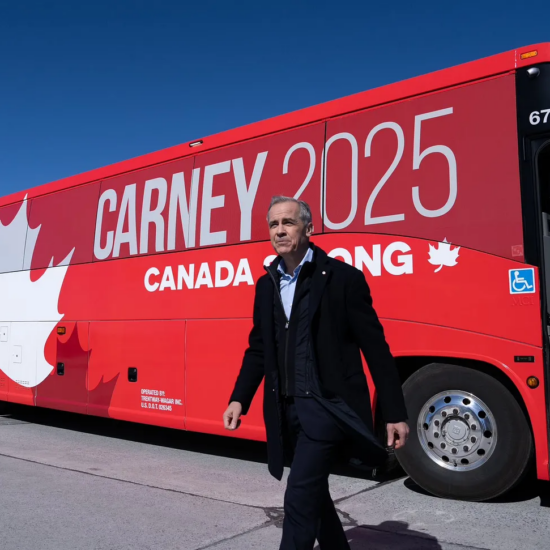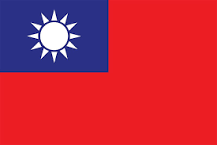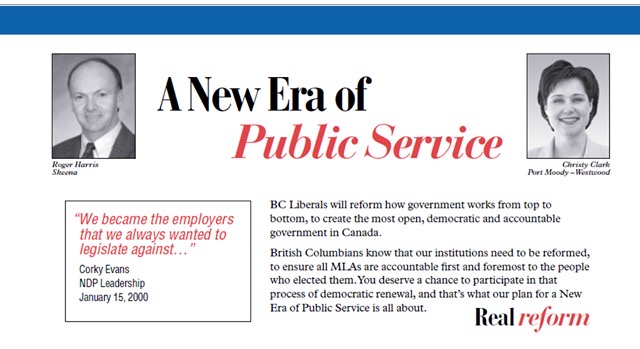
Bob Mackin
Premier Christy Clark’s first photo op of 2017 on Jan. 11 was to announce her rubber-stamping of an environmental certificate for the twinning of the Kinder Morgan tar sands oil pipeline. Exactly one year after the Clark government told the National Energy Board it opposed the project.
Flip, meet flop.
The BC Liberals and press gallery acolytes were abuzz. An election issue! The election issue! The Get to Yes party versus the NDP, the Party of No! Let the horse race begin! It’ll be like 2013 all over again!
Not so fast. This cannot and should not be a referendum on pipelines. The 41st general election must be a time for citizens of British Columbia to issue their report card on the ruling party. The BC Liberals know that change is in the air and that politicians are like diapers. They should be changed more often than once every 15 years. Fifteen years was also the length of the last Social Credit dynasty.
So the BC Liberals, armed with millions of dollars from the public treasury and their poorly regulated, anything goes fundraisers, are running a campaign about the future, while they run away from their past. No surprise. Their past is a recipe for defeat. They know that there is simply too much fodder for the NDP and Greens to play with.

From the BC Liberals’ 2001 New Era platform. Promises made, promises broken.
What does that record include?
Scandals like the firing of eight health researchers (which drove one of them, Roderick MacIsaac, to suicide), Triple Delete, Quick Wins and Swing Teams, the BC Rail privatization and Basi-Virk legal bills. The Mount Polley tailings dam disaster and exempting $9 billion Site C dam from B.C. Utilities Commission approval. Cash for access and pay to play. Clark’s $50,000-a-year commission for attending party fundraisers and her expensive charter jet flights to and from her Kelowna riding. Increased ambulance wait times, taxing senior citizens who must use wheelchairs and underfunding the public schools system. The proliferation of homeless camps. Letting real estate corruption run amok in Metro Vancouver. Inadequate treatment for opiate addicts and lax enforcement of drug laws. Raiding the accounts of Crown corporations to artificially balance the budget and keep income taxes low, and then hiking the prices for electricity, vehicle insurance, medical insurance, ferry fares and beer to pay for the shell game.
Just the tip of the iceberg.
It is a general election and that history cannot be ignored. The public already knows that.
A poll by Insights West last November found that respondents ranked housing/poverty/homelessness, economy/jobs, healthcare, environment and government accountability as the top five issues, in that order.
Energy/pipelines/LNG ranked a low seventh on the list.
That government accountability scored so high is a sign of the times. This is supposed to be a democracy, not an oligarchy.
Government accountability is an issue that I spoke about before the last election, when I appeared as the guest speaker at the annual general meeting of the B.C. Freedom of Information and Privacy Association.
B.C. FIPA is a civil society organization with a goal “to empower citizens by increasing their access to information and their control over their own personal information.”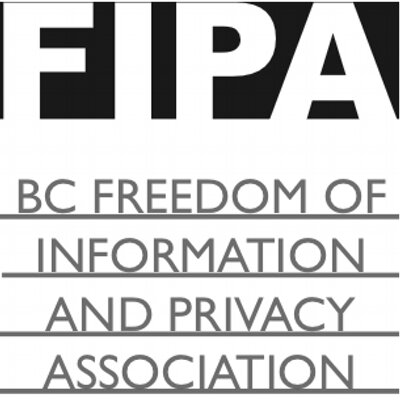
The AGM was April 11, 2013. Below are my speaking notes from that evening. Some of the names and circumstances have changed with time, but it generally remains fresh.
Four years to the day, on April 11, 2017, the general election period is scheduled to officially begin.
My message to you: make the May 9 election about pipelines of information.
April 11, 2013, People’s Law School, Vancouver
Thank-you for coming tonight. Thank-you to Vince and Tyler from FIPA BC for the invitation. Fifty-nine years ago today — the most boring day of the 20th century, according to Cambridge University researchers. No famous births or deaths or major events on April 11, 1954. I will try to help end the day on a high note.
The election writ drops on April 16. Can you feel it? Silly season is already here. The Liberals are focussing on Bollywood. The NDP is focussing on Hollywood North.
The election will be about oil, natural gas, tankers and pipelines. We need to get back to basics. We need to make this the election about information and privacy pipelines.
The privacy pipeline that flows from citizens to government should be as narrow as a straw, made of steel — to prevent leaks — and the contents should flow deliberately. Like the thickest milkshake youʼve ever had.
The information pipeline that flows the other way, from government to citizens, should be as big as a truck to drive through and made of plexiglas. Let it flow as fast as a waterfall.
The problem is, the governments we have, using the laws that exist, have engineered a straw-sized information pipeline that flows like molasses and a fat, leaky data pipe. The people in power control the flow of information as they seek to build mini-empires.
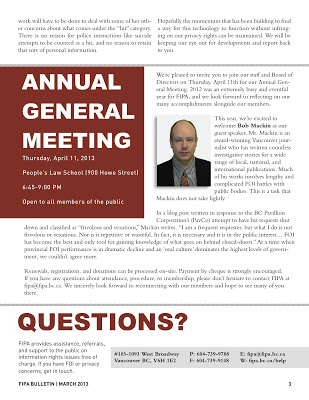 Denise Rudnicki wrote a Carleton University thesis in 2009 called “Information or Persuasion” about how the federal government pioneered the permanent campaign. (The next one begins May 15 here in B.C.) The roots are 1969ʼs Task Force on Government Information and its report, called “To Know and Be Known.”
Denise Rudnicki wrote a Carleton University thesis in 2009 called “Information or Persuasion” about how the federal government pioneered the permanent campaign. (The next one begins May 15 here in B.C.) The roots are 1969ʼs Task Force on Government Information and its report, called “To Know and Be Known.”
The government realized it could use advertising and public relations to leapfrog the media, and go direct to citizens. Who needs reporters? They think and ask questions. Weʼre just a pain in the ass.
Rudnicki wrote on J-Source.ca:
“This goes way beyond spin. This involves a sophisticated, government-wide, coordinated communications apparatus, well- resourced and professionally staffed, and designed to persuade people of the rightness of the government’s position by marginalizing the views of opponents and by using the media to shape and manage public discussion of policy. Calling this effort ‘spin’ is like calling a tsunami a wave.”
“This is a hugely uneven playing field. Groups that are opposed to any government initiative are under-resourced by comparison. They do not have 15-page communications plans, a communications branch to unify their message and media- train their spokespeople; they do not have the ability to conduct focus groups, do advertising, and rely on the advice of professional communicators to win the public relations war.
“Journalists are equally disadvantaged. Thousands of people work in government communications and millions of dollars are spent at the same time newsrooms are shrinking and fewer journalists are being asked to do more with less. Journalists will never be able to level the field but understanding the game will allow them to analyse it more effectively for the benefit of their readers, viewers and listeners.”
The federally mastered corporate communications model was adopted by the provincial government. It has infected Vancouver city hall — under a mayor who came to power in 2008 promising transparency.
Senior bureaucrats were once happy to connect with journalists and citizens, to explain how the city works and what they were doing to make it livable. Theyʼre not allowed anymore. All questions must go through the communications office. Good luck if you want an interview from an expert or decision-maker. Good luck if you want any useful information by deadline.
Now the Mayor, like the Premier, is using open data as a decoy. It is a ruse, to fool us into believing that theyʼre being open and transparent. When theyʼre not. Gee-whiz data sets with maps of fire hydrants and manhole covers are probably useful to someone.
But why were those locations chosen? Who was the supplier? How were they chosen? How much did they cost? Open data must come with open information to be useful. (I filed such requests yesterday, to test the city and its new digital strategy.)
How bad has it become? How many bureaucrats does it take to screw in a lightbulb? (With apologies to any bureaucrats here tonight.) Trick question — none, because the job was privatized. In April 2012, the Ottawa Citizen revealed the story behind the story, when it asked the National Research Council about a study it did with NASA about falling snow.
The feds sent an email with a non-answer. Seven sentences without mention of snow.
The Citizen called NASA and in one 15-minute phone call, the Citizen got the answer. NASA just wanted to advance the science of snowstorms. So the Citizen filed an Access to Information request.
How many bureaucrats did it take to handle the original reporter? The answer? Eleven. Enough for a soccer team. The National Research Council bureaucrats sent a dozen emails back and forth to formulate an answer. To manufacture their message.
When I got into the business as a wide-eyed Langara J-school kid in 1990, things were different. Fax machines and answering machines were high tech and politicians were reachable — if they were at their desks.
Those days are gone. Bureaucrats canʼt say much and politicians donʼt want to say much. They can hide behind email.
So we use Freedom of Information. Even that is getting harder.
For a variety of reasons, including transparency, Reporters Without Borders ranked Canada 20th on the press freedom index last year. We used to be 10th.
The year before that, 2011, was the year of the protest. The Arab Spring and Occupy Wall Street. Average citizens were mad as hell and couldnʼt take it anymore with the lying, cheating corporate bigwigs and their friends in political office. Government workers on the take. Brutal cops, soldiers and spies. It started after the 2010 Commonwealth Games in Delhi — the most corrupt sporting event since the Montreal 1976 Olympics. Indians took to the streets by the thousands and some even did hunger strikes, to seek justice against the corrupt organizers.
The top two executives, Suresh Kalmadi and Lalit Bhanot, were charged with corruption.
From India to North Africa to the Arab peninsula, people wanted corruption to stop. Because, without transparency and integrity in government, can we have a democracy or even freedom?
This — the smart phone — is our greatest tool. We can tell our stories to the world, in words, pictures and sounds. Instantly through social media. Thatʼs what they were doing from Tahrir Square to Zuccotti Park. Dictators and their friends fear it. Or do they?
While the media has become bigger and stronger and more relevant than ever, technology and the economy have made it smaller and weaker and less relevant. And so democracy is under attack.






